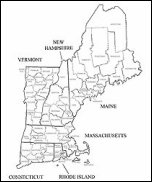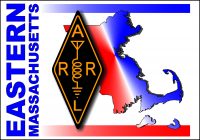 Tom Frenaye, K1KI writes on YCCC@yccc.org:
Tom Frenaye, K1KI writes on YCCC@yccc.org:
“I think we’re finally ready for the New England QSO Party this weekend – May 1-2.
Some people call the CQWW or ARRL DX Contest the New England QSO Party, since W1 stations often do quite well. You’ll find the real NEQP at least as much fun since everyone will be calling you if you live in one of the NE states! Many people start out their contesting career in state QSO Parties – so please get on for a few hours!
There are certificates for those making at least 25 QSOs, and we’ve had a lot of support from the YCCC, and other clubs and individuals so there are 27 plaques to be awarded.
The NEQP is a low pressure, fun operating event that starts at 20z on Saturday until 24z Sunday, with a break from 05z-13z. Most of the activity will be on 20 and 40 meters, but you’ll also find people to work on 80, 15 and even 10m if the sun cooperates. The full rules are below, or go to the web site at http://www.neqp.org/ for more information.
Thanks! Tom/K1KI and Bob/W1RH
New England QSO Party Rules
Object: To contact as many New England stations in as many New England counties as possible on 80-40-20-15-10m. (New England stations work anyone)
Date: First full weekend of May (May 1-2,2004 and May 7-8, 2005).
Contest Period: 2000Z Saturday until 0500Z Sunday (4pm ET Saturday until 1am ET Sunday) and 1300Z Sunday until 2400Z Sunday (9am ET Sunday until 8pm ET Sunday).
Categories: Single operator high power, low power and QRP categories, plus multioperator, single transmitter. Same four categories for mobiles. Single operator stations using assistance during the contest (packet or Internet spotting nets, etc.) will compete in the multisingle category.
Contest Exchange: Send signal report and state/province (DX stations send signal report and “DX”). New England stations send signal report, county and state.
Valid Contact: Work New England stations once per band/mode. New England stations work anyone(and must copy the county for New England stations worked). CW contacts must not be made in the phone band segments. Mobiles can be worked again in new counties. County line QSOs should be logged as two separate QSOs. Crossmode, crossband and repeater QSOs are not permitted.
QSO Points: Count one point per phone QSO, two points per CW (includes digital modes)QSO.
Multiplier: Stations outside of New England use counties as multipliers for a total of 67 CT/8 MA/14 ME/16 NH/10 RI/5 VT/14). New England stations use states(50), Canadian provinces(14) and DXCC countries as multipliers.
Scoring: Total score is QSO points times the multiplier. Mobiles count QSO points per county and multipliers from all counties (counted once).
Suggested frequencies: CW – 3540 7040 14040 21040 28040, Novice/Tech – 3705 7130 21130 28130, SSB – 3880 7280 14280 21380 28380
Reporting: Logs should indicate times in UTC, bands, modes, calls and complete exchange. Multipliers should be clearly marked in the log. New England stations put your club’s name on the summary sheet. Entries must be submitted within 30 days and sent to NEQP, P O Box 3005, Framingham MA 01705-3005 or via e-mail to logs@neqp.org (Cabrillo format preferred). Send a large SASE for a printed copy of the results.
Awards: Certificates will be awarded to the top scorers (25 QSO minimum) in each New England county, U S state, Canadian province and DXCC country. At least twenty plaques will also be awarded to top scorers, and some special awards are available to non-New England stations (check the web site for the current list).
More information: The New England QSO Party web site is at http://www.neqp.org. Check there for information on planned fixed station and mobile activity from New England counties, contest software information, county abbreviations, plaques to be awarded, and information on New England state county awards. NEQP results will be posted on the web site when they are complete. Questions can be addressed to info@neqp.org.

